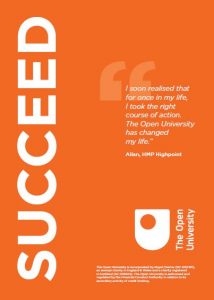
PET is proud to partner with the Open University (OU) in prisons, supporting people to study for Access modules and begins degrees. This year the OU turns 50, and to celebrate we asked Ruth McFarlane to share just a snapshot of some of the brilliant opportunities that the OU offer across the secure estate.

Ruth leads the Students in Secure Environments team at the Open University, supporting around 1800 students in prisons and secure hospitals currently studying for an OU degree.
Distance learning can be a lonely activity, and we work hard at the OU to create learning communities so that students can engage with their peers and share experiences. We know that this can make a real difference, especially when students are finding things tough.
For OU students in prison, this isolation is exacerbated by the lack of social media or other online options increasingly available to mainstream students. However, the OU has been supporting students in prison since 1971 and we know that this environment offers other options for a study group and peer support to develop.
The OU orderly role was introduced at HMP Ashfield and is now in place across a number of universities where there are more than 20 OU students. The orderly is an experienced OU student who helps with administrative tasks such as registering for a module, keeping track of when assignments are due or taking bookings for computer use. They also arrange study groups for more generic support sessions, particularly for people who are new to OU study, who can benefit from the experience of others. We have found that this increased focus has made a real difference to student success, with average assignment scores going up, as well as overall student numbers in those prisons. This is an excellent way to demonstrate our commitment to the OU aim of ‘more students qualifying’.

All OU students are allocated a tutor who supports them throughout a module, offering guidance and feedback on assignments. Where possible, tutors visit students in the prison or offer telephone support, and this also depends on the facilitation of prison education staff, many of whom are wonderful. The value of this tutor support was summed up by Liam, who served a 10 year sentence and completed his degree shortly after his release :
“What needs to be acknowledged is the drive and determination of the Open University tutors I have had during my studies. Without a doubt, without them and their constant, active engagement with me and their encouragement when I wanted to give it all up I would not have completed my studies.
“The determination of the tutors when faced with the realities of a prison security department and the rules and restrictions was quite inspiring. It encouraged me to persevere and I am glad I did.”
This quote reminds us of the importance of personal contact, which we are also developing through a series of open academic seminars now being held regularly in several prisons in the Midlands. These have been well attended by a very engaged audience, with OU academics who have presented on a wide range of topics from space science to politics. This is helping to increase the appetite for higher-level study, and has the added benefit of giving academics more of an insight into the challenges of studying in prison, so that we can further tailor the support we offer.

At other establishments we have run study skills sessions focusing on generic skills such as note taking, referencing or exam preparation. These help to strengthen the learning culture within a prison and replicate some of the online help that is available for mainstream students. We currently have a student on ROTL working in our team preparing an evaluation of the impact of these sessions, which we look forward to sharing.
Finally, we recognise the need to play to our strengths. We are a distance learning institution offering higher education to students in all prisons across the country. This means we can support people when they move across the estate and when they are released, but we cannot always offer the regular long-term local support that makes such a difference to students. We are really pleased to be developing links with a number of Prison University Partnerships, particularly the Inside Out programmes. This localised university engagement in prisons is recognised as offering a much-needed level of participation in higher education and we are now offering on-going accreditation pathways to students who want to pursue a degree while they are in custody and also when they are released.
Many of these initiatives are being facilitated by the Students in Secure Environments (SiSE) team at the OU, and if you haven’t yet heard about our fabulous colleague Stephen, please do take a moment to read his story, which has been featured as part of the OU 50th birthday celebrations. And follow us on Twitter for more regular updates.
Want to set up your own partnership or get tips for an existing collaboration? Our PUPiL toolkit shares the what, how and why of prison-university partnerships.
This is part of the Prison University partnerships blog series, which shines a spotlight each month on an example of prisons and universities working in partnership to deliver education. If you would like to respond to the points and issues raised in this blog, or to contribute to the blog yourself, please contact Helena.